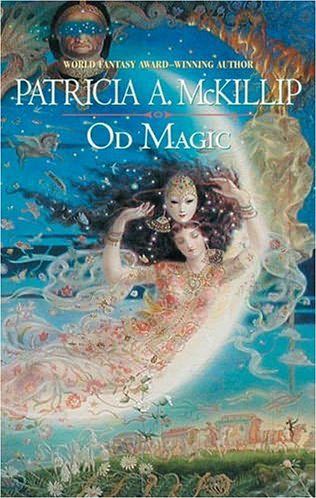Patricia A. McKillip, Od Magic
reviewed by Danielle L. Parker

|
|
Od Magic
Author: Patricia A. McKillipPublisher: Ace, 2005 Hardcover: $22.95 Length: 315 pages ISBN: 0-441-01248-5 |
Some authors deliver consistent product. Whether you think Mercedes Lackey is a competent hack or a great storyteller, either one, it’s for sure she delivers consistent product, and lots of it, bless her workaholic self. Pick up a William Gibson story, and you know what you get, too. Terry Pratchett, whether you get his unique brand of humor or not, does the same. You can count on what you’re going to get when you see the names.
Then you get those writers, like an athlete who’s spent the last five years training for an Olympic one-shot, who produce one great work, and never after exceed it. Anne Rice is one. I read her groundbreaking “Interview with a Vampire” and looked, afterwards, for something that came close. I even tried, in my innocence, something she wrote under her Anne Rampling pseudonym, and ended up chucking the book across the room in anger that such as mish-mash of kinky sex and S&M and tired porno plotting ever made it onto the shelves of my library. You’d have to hold a gun to my head to make me try another, now, and you told me your gun had a few empty chambers, I might risk shutting her book in your face still.
Maybe Patricia A. McKillip hasn’t fallen nearly as far, but it’s for sure, nothing I’ve read since her original fantasy classic, The Riddle-Master of Hed, has fulfilled its bright promise. The prose styling that has hardened into an instantly recognizable caricature of itself in her later books felt natural in her great trilogy. There was the obsession the protagonist Morgon feels for the mysterious, elusive, fascinating Deth; there was betrayal and redemption and sacrifice and ambiguity in a worthy climax to an involving journey. It was a book I bought for my permanent library shelf.
What do we have in Od Magic, and all too often in ‘Riddle-Master’s’ successors, instead? We have a kind of simplistic fairy tale, actually, with a joyless we’ve-all-just-been-misguided, and now-that-it’s-all-explained, we’ll-all-be-good-again happy ending. Where’s the joy and fear and human complexity? Can we get this prose to bleed again? Can we get some conviction going here? Do bad people simply need an over-sized mama figure to rap them on the knuckles and explain the folly of their misguided, but didn’t-really-mean-it ways, in order to be good again the rest of their life?
I wish redemption were so easy and story morals less obvious. We start out with a catalyst figure, the innocent wild-man archetype, a sorcerer who doesn’t know he’s got the magic. Brenden Vetch, living the noble savage life on the mountainside with his uncut hair and the plants he tends to more carefully than he does his personal bathing and clothes washing, is invited to mind the garden in the school for magicians. Od, the mysterious, immortal, and giant-sized sorceress who founded the school, issues the call herself.
Once there, of course, all that innocence can’t help but act as an irritating spoke in the wheels of the smoothly controlled workings of temporal power. The king wants to know. The king’s counselor, the ruthlessly realpolitik young wizard Valoren, wants to know. Who’s this fellow, and what might he do with all that power he seems to have? Throw in a few more apparent loose cannons at the same time, in the form of a traveling magic troupe and some mysterious stone sleepers, and the king is beside himself and ready to go Stalinist. If you’re not for us, you must be against us. What we don’t know is sure to hurt us. If we can’t understand it, shoot it.
The hit-me-in-the-face moral, and the goodness-we-were-just-misguided, now-we-know-better ending is a letdown. McKillip still writes prose as if it were poetry, of course, though that talent has almost become too obtrusive, to my mind. We also have a potentially intriguing character in a young woman who operates, like the man behind the curtain in the Wizard of Oz, half a huckster and half a magician. But this story fails of its promise, too.
So, Ms. McKillip, stop with the consciously pretty prose. Make the characters bleed and hurt again. Give up the fairy tales and go for broke. Don’t hit us over the head with the moral of your story: humans are more complex than you think. Or at least, if you have to write fairy tales, let’s go for Grimm as our inspiration next time, ok? A wishful fan says, you can do it!
Copyright © 2006 by Danielle L. Parker

